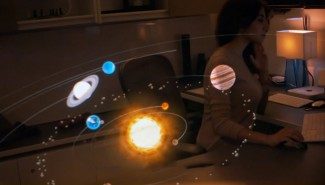The secretive augmented reality project Magic Leap enjoy their fantastical teaser videos, but their latest takes a more sober tone by demonstrating the potential for the technology as a user interface to your life.

There’s not much new that exists in the world of technology that isn’t either telegraphed months or even years ahead of time or the details of which are somehow leaked before the thing in question makes an appearance. The team at Magic Leap however have managed to keep their augmented reality helmet hidden from everyone but a select, chosen few since we first heard about it back in 2014. The project has since secured 100’s of millions of dollars in funding and all before anything of the device has been seen in public.
This means that any information that is released, is usually pounced upon and that includes their various teaser videos. Originally taking the form of target render footage, the last few peeks into the AR helmet’s capabilities have stressed that what’s being shown represents what it’s like to use Magic Leap.
The latest is the most reserved and practical video from Magic Leap to date and strives to illustrate what it’s like to live every day life with AR, the user experience whilst interacting with applications and just what this brings to the table (literally in this case) as a computing platform.
It’s interesting though that Microsoft’s HoloLens appearances have rendered such demonstrations almost pedestrian at this point, with applications and data overlaid and set upon your physical world its piece de resistance. Nevertheless, the video does illustrate that the computer vision systems used to anchor virtual objects in physical space is working remarkably well, albeit with seemingly very deliberate careful head movements from the demonstrator and some detectable mismatches in movement. How the user is interacting with the imagery isn’t clear however, with actions within the UI made without any hand interaction – eye tracking perhaps?
The video comes as part of an in-depth exploration of the highly secretive project by WIRED, who’s excellent piece nevertheless still leaves many questions unanswered, like when the hell can we try it for ourselves? We’re still no closer to knowing when Magic Leap will cease its vapour trail and produce the good – but we’ll let you know as soon as we do.






